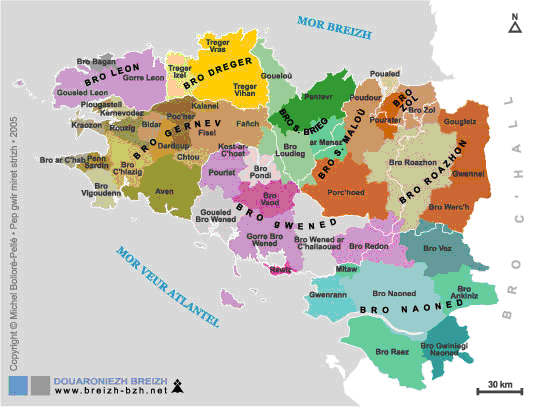
Well, well, well, now it's the French's turn to drape themselves in linguistic smugness. I have already discussed here how Spain is in turmoil over the decision by some of its regions to attempt to eliminate the teaching of Spanish in schools and for it to be replaced by the learning of the autonomous tongue. It seems that their Gallic cousins have similar problems of their own.
For years France's regional languages have been seen by Paris as a threat against national unity. The fact that children were punished for speaking Breton, or Occitan or the Alsatian dialect in the playground or inside school should not be overlooked or addressed glibly. But now, just as the French parliament has decided to recognise minority languages in the constitution, a new war of words has broken out.
L'Académie Française, the institution that defends the purity of French, recently issued a furious warning that recognising regional languages in the constitution would be "an attack on French national identity". It goes without saying that the reaction from the regional quarters was swift and to the point. They criticised the academy for being such a ridiculous relic of outdated nationalism.
L'Académie Française, the institution that defends the purity of French, recently issued a furious warning that recognising regional languages in the constitution would be "an attack on French national identity". It goes without saying that the reaction from the regional quarters was swift and to the point. They criticised the academy for being such a ridiculous relic of outdated nationalism.
Which poses the following question: Just what is it with regional languages and dialects that gets up people's noses so much?
The French example is very different from the Spanish one. In the former, people want their local lexicons to be recognised as an essential part of the French language, and culture I suppose. In the latter, local authorities want to do away with Spanish altogether.
To me the French experience is the one that would reap the better results. The Breton, Occitan and Alsatian languages and dialects feed into the French language, thus making it richer. The fact that they could be recognised in the constitution would render them more valid, an aspect that I am sure their many speakers would appreciate.
Yet, once again, the busybodies from the French Academy, like those interlopers from the Academy of the Spanish Language, find fault with what is no business of theirs. I say, get rid of these two meddling institutions and allow both Spanish and French to soar away to the heights we know they are capable of! English is always my favourite case study. No central linguistic body to report to and look at how it's become the lingua franca par excellence. A lesson for both academies to learn.
Copyright 2008
Hi! I found your blog through Maithri's (The Soaring Impulse). I don't know much about this whole getting rid of dialects thing because yeah, we really don't have any in English but the whole thing sounds preposterous. Seems to me, the different dialects, etc. would make for a richer culture. Anyway, nice blog, glad to have found you!
ReplyDeleteWhy?
ReplyDelete...do governments meddle?
...would anyone want to get rid of culture, history, regional dialects?
Why?
Thanks, karma, English DOES have its own dialects and local languages. Over here we have the Scouse, Cornish, Mancunian and myriad other regional lexicons. But they are an integral part of the linguistic make-up of GB. It has not always been the case and in the past most people who went for jobs in the media had to have what was called a 'BBC accent', i.e., not regional. Yet over the last few years this trend has been reversed and now you can see many broadcasters, including newsreaders, with Scottish, Irish and Welsh accents.
ReplyDeleteYes, diva, why do governments meddle?
Fear, I suppose. Fear of allowing people too much freedom, even if it is at a linguistic level.
Thansk for your comments.
Greetings from London.
"Which poses the following question: Just what is it with regional languages and dialects that gets up people's noses so much?"
ReplyDeletethis is what i wonder. i suppose it all comes down to fear. i know i'm trying to learn as many languages and dialects as my brain can hold. i only see it as beneficial.
love you blog.
Thanks, fly. I will be paying you a visit soon.
ReplyDeleteGreetings from London.